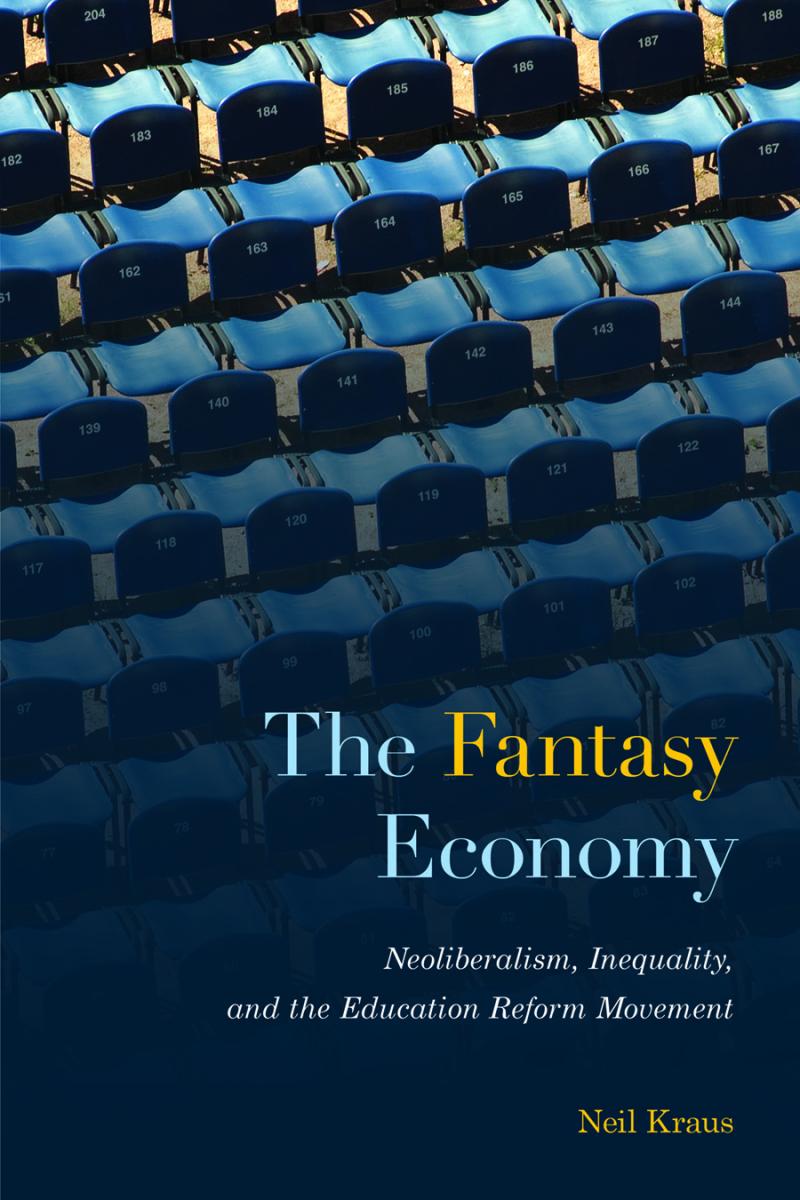- About
- Programs
- Issues
- Academic Freedom
- Political Attacks on Higher Education
- Resources on Collective Bargaining
- Shared Governance
- Campus Protests
- Faculty Compensation
- Racial Justice
- Diversity in Higher Ed
- Financial Crisis
- Privatization and OPMs
- Contingent Faculty Positions
- Tenure
- Workplace Issues
- Gender and Sexuality in Higher Ed
- Targeted Harassment
- Intellectual Property & Copyright
- Civility
- The Family and Medical Leave Act
- Pregnancy in the Academy
- Publications
- Data
- News
- Membership
- Chapters
The Fantasy Economy and the Postliberal University

The Fantasy Economy: Neoliberalism, Inequality, and the Education Reform Movement by Neil Kraus. Temple University Press, 2023.
In his book The Fantasy Economy, political scientist Neil Kraus argues that a loose network of political and economic interests—including donors, elected officials, and nonprofit organizations—contributed to a narrative that drove policymaking in the late twentieth and early twenty-first centuries. Kraus dubs this narrative “the fantasy economy.” In his account, the fantasy economy forecasts nearly endless demand for skilled labor in the US workforce and blames our education system for failing to meet this demand. He then illustrates two of the fantasy economy’s far-reaching consequences for public life. First, this narrative has shifted attention away from policies more likely to promote equality, such as those related to housing or wealth accumulation, by focusing almost solely on education. Second, the fantasy economy narrative implies that the education system is permanently deficient because it always fails to produce enough of the right kind of skilled workers.
In a series of empirical chapters, Kraus carefully demonstrates the gap between the fantasy economy’s endless demand for skilled labor and the labor market itself. I am not an economist, so I leave the assessment of these claims to our colleagues in the so-called dismal science. As a scholar of higher education, however, I am much better able to comment on Kraus’s analysis of decades of education politics and policy. Further, as a professor at a public university, I find the implications of his analysis for higher education to be strikingly relevant for the work that my colleagues and I undertake every day. There is a good chance that it is relevant to other readers of Academe too.
Kraus’s history of twentieth-century policymaking reminded me of a 2022 book that covered a similar period, Gary Gerstle’s The Rise and Fall of the Neoliberal Order. Gerstle argues that the New Deal political economic order of expansive government regulation was succeeded by the neoliberal order that used the power of the state to amplify market-like competition. Gerstle concludes that the neoliberal order, within which Kraus squarely situates the fantasy economy, came to an end with the emergence of Donald Trump and a more openly ethnonationalist political Right.
My Michigan State University colleague Brendan Cantwell and I—in a 2024 article for Change—examined this new Trump-era approach to policy and governance as a means of creating postliberal higher education. In our analysis, postliberal higher education arises when assertive state governments, trustees, and donors create unstable conditions for colleges and universities. This policy environment serves higher education’s postliberal purpose. Instead of providing a public or private good, the postliberal university serves as a partisan good that is beneficial only for some people. Expansionist state governments have devalued professional expertise and decentered the role of campus personnel in decision-making— what I have elsewhere called a process of “deinstitutionalization”—to facilitate greater partisan control of higher education.
The dramatic changes facing contemporary higher education heighten the urgency of The Fantasy Economy. Kraus gives us a thorough inventory of the legacies and architecture that the neoliberal order has left for higher education. Those legacies condition what will come next. If we want to understand the nature of the postliberal university, we should start with accounts like The Fantasy Economy that explain how we got here.
Kraus also provides a good account of why managerial responses to higher education’s political problems often fail, since the fantasy economy was never about producing more skilled workers to meet labor market demands. Rather, it was a policy narrative created both to distract from redistributive policy and to undermine higher education’s democratic role. State disinvestment and accountability policies followed logically from the framing of higher education as permanently failing to meet labor market demands. Because the sector’s presumed failures were central to the narrative, no change in the performance of public colleges and universities could have convinced the architects of the fantasy economy that higher education was doing its job. Kraus’s analysis is therefore a vital reminder for those hoping that strong executive leadership or technocratic management can help higher education to navigate the postliberal era. Providing a public or private good efficiently is unlikely to appease those demanding that higher education produce partisan goods. It is for this reason that I consider managerial responses to political problems as, at best, partial defenses of higher education.
The Fantasy Economy is a vital read for anyone interested in understanding how higher education policy became what it is today and why decades of managerial reform have done little to change it. However, it is worth noting that change does happen. Change, the magazine where my coauthored article about the postliberal university appeared, is an outlet that Kraus has flagged as central to translating the fantasy economy into higher education practice. Of course, determining how to develop and defend a higher education system that contributes to an inclusive democracy is far more difficult than shifting the editorial focus of a publication. For those interested in doing such work, however, Kraus’s book is a good place to start.
Barrett J. Taylor is professor of counseling and higher education at the University of North Texas.



